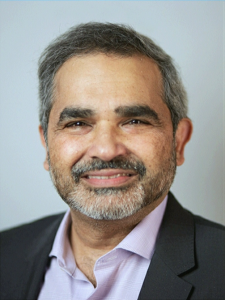Faisal Mushtaq ’88 came to UW-Madison to study computer engineering and computer science with the goal of becoming an embedded systems engineer. He is currently senior advisor of Data/AI Center of Excellence at Frazier Healthcare Partners. He serves on boards of several healthcare companies, as well as being an enthusiastic member of the UW-Madison Computer Sciences department Board of Visitors. Read on to learn about his experiences at UW-Madison and after – and about why he loves fast cars.
What are you currently doing professionally? What do you like about it?
Working to create enterprise value at various private equity-owned portfolio companies, either as a Board Member or as Senior Advisor to CEOs.
Is there a project or accomplishment that you’re especially proud of? Why?
Recently, we were able to create substantial margin expansion at a healthcare services company by reducing administrative errors and eliminating duplicate effort through Machine Learning techniques and Large Language Models. It did not take significant capital expenditure to improve operating processes materially.
What motivated you to study computer science?
Computer science promised to be a foundational competency that would allow me to innovate in many areas of business, including finance, healthcare, supply chain, etc.
Why did you come to UW-Madison?
I was interested in working at the intersection of computer engineering and computer science as an embedded systems engineer. UW-Madison offered the opportunity to pursue both programs simultaneously to create a unique competency.
Are there lessons you learned at UW-Madison that have stuck with you ever since?
Many ground-breaking innovations (such as an iPhone) require cross-disciplinary understanding and collaboration among many participants.
What are one or two things you did at UW outside of your classes (clubs, study abroad, employment, conferences, internships, etc)? How did these benefit your education, your current career, and/or your life?
I was an undergraduate teaching assistant in the ECE department and was active in the Pakistan Student Association. Each opportunity had its unique benefits; however, they both allowed me to learn to interact with people of different experiences, create consensus among individuals with varying motivations, and use listening as a practical leadership tool.
Do you have any advice for current CS students?
Computer Science education can be most transformative when one seeks to understand the core need and “the why” something needs to be solved. Invest in honing your communication, listening, and activating skills.
If you had unlimited resources, what kind of tech startup would you create?
I would create a healthcare startup that solves one of the most significant problems in healthcare: data interoperability among healthcare participants.
Is there anything someone told you at the start of your career that helped you?
Give people what they need, and they will buy your product. Never confuse someone liking your product with them also agreeing to pay for it.
What do you like to do for fun?
I have a love of fast cars. Fast cars keep my engineering brain engaged, while also offering the freedom to be extraordinary.
 By
By